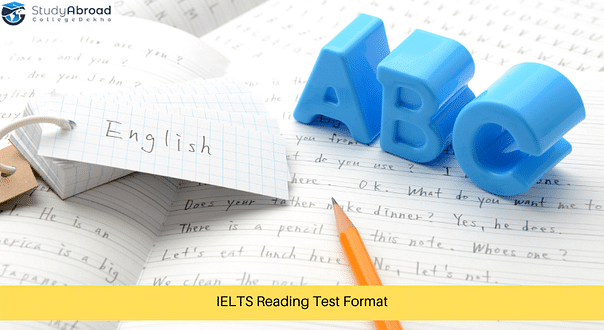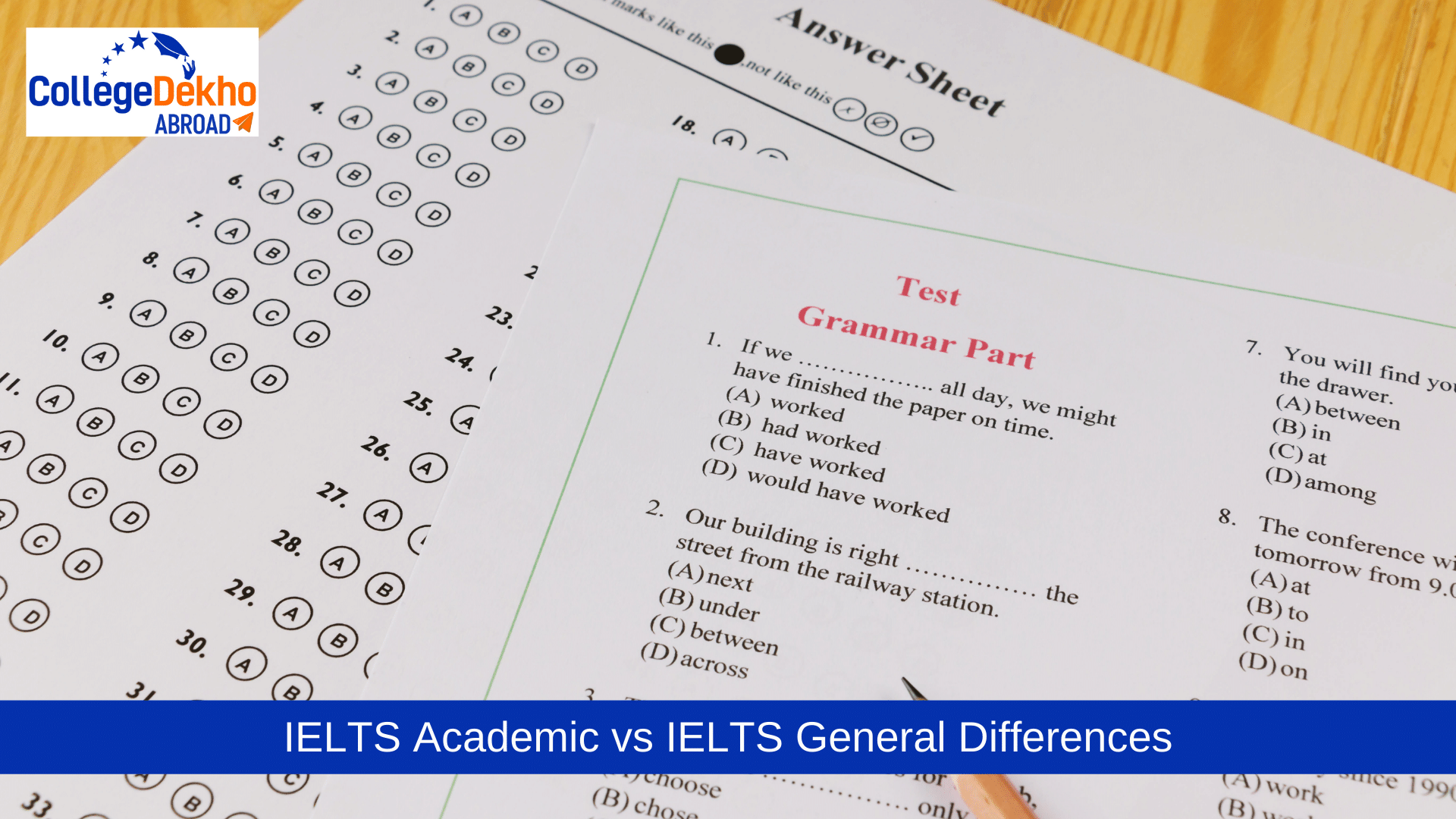Taking the IELTS? Well, the first thing then would be to learn the IELTS reading test format and question types in order to create an appropriate study plan, prepare methodically and score high on the test.
The IELTS, recognised by over 9,000 universities worldwide, is split into four sections: Reading, Writing, Speaking and Listening, each playing significant roles in determining your overall band score.
Every section in the IELTS reading has a different format and type of questions, thereby requiring adequate attention and understanding. The IELTS Reading Test format is designed to test a spectrum of reading skills including understanding logical argument, reading for detail, reading for gist, reading for main ideas and so on.
Know All About IELTS, TOEFL and Other English Proficiency Tests!
What is the IELTS?
IELTS is an English Language Proficiency Test that allows international applicants to establish a benchmark of their understanding and fluency level in the language.
IELTS is considered credible evidence of English proficiency by all English-speaking countries who have their first language as English. These include countries such as Australia, Canada, the UK, USA. and New Zealand. The test is conducted jointly by the British Council, IDP and Cambridge Assessment English.
The IELTS is scored on a 9-bands scale. The test is conducted based on the skills of listening, reading, speaking, and writing.
The scores are accepted not only by the institutions of previously mentioned countries but also by the companies and immigration authorities all over the world.
Test Variants of the IELTS
The test is conducted in two types of variants Academic and General. The authorities conduct the same Listening and Speaking tests for both variants but the Reading and Writing tests of the two IELTS test formats are differently set.
While the 3 sections except Speaking are conducted in a single session of about 2 hours and 45 minutes, the students can take the Speaking test within a span of 1 week before or after the main test.
Overall Format of IELTS
While all the sections are equally important, the IELTS Writing and IELTS Reading sections make up the majority of the test and therefore require strong preparation from the candidate’s side. In this piece, we shall be dealing with the IELTS Academic test format and General test format so that you can become aware of both the IELTS reading format and IELTS reading question types asked to solve in the actual test.
|
Format Details |
Academic IELTS Reading Test |
General IELTS Reading Test |
|
Duration |
60 minutes |
60 minutes |
|
Total Marks |
40 |
40 |
|
No. of Questions |
40 |
40 |
|
Targeted Abilities |
Non-specialised text with a target on abilities required to pursue academics. |
A mixture of specialized and general text with the target on abilities required in everyday life and practice. |
|
Sub-sections |
3 long texts no specific distribution |
Social Survival Workplace Survival General Reading |
Note: In both tests, candidates are required to transfer their answers on a separate Answer Sheet. This task has to be done within the allotted 60 minutes only.
Learn About English Proficiency Test Requirements of the Universities of Your Choice!
Format & Question Types in the Academic & General IELTS Reading Test
Mentioned in the table below are the format and types of questions asked in both the IELTS Academic and General IELTS Reading tests:
|
IELTS Reading Question Types |
IELTS Reading Format |
Ability/Task Tested |
Tips to Solve IELTS Reading |
|
Multiple Choice |
Choose best; 1 from 4 options (a,b,c or d) 2 from 5 options (a,b,c,d or e) 3 from 7 options (a,b,c,d,e,f or g) |
Overall text understanding Understanding of specific points |
Follow either of the following approaches: Elimination of wrongs Selection of best suited |
|
Identifying Information |
Identify the statement in relation to main text as; True False (or wrong) Not Given (not enough information to conclude OR simply not mentioned) |
Recognition ability Ability to draw conclusions from the main text Identify the nature of conclusions. |
Test the answers by placing them in the context and format of the text. |
|
Identifying Writer’s Views |
Compare the statements with writer’s views or claims in main text and answer as; Yes No (opposite from writer’s views/ claims) Not Given (not enough information OR non-related) |
Idea recognition ability Comparison ability Understanding of arguments |
Test the answers by placing them in the context and format of the text. |
|
Matching Information |
Find in text related information to the question as; Specific text Reason Example Description Comparison Summary Explanation Related paragraph or section’s letter(s) have to be mentioned as answers |
Ability to scan for information Recognition and plotting of correct information |
Read the text itself in concentration to retain the details better. |
|
Matching Headings |
Match the given heading to the paragraphs or sections in text and write the related letter. No heading shall match with more than one paragraph or section Some headings might not match with any section or paragraph |
Recognise main idea or theme of the text Distinguish between main and supporting ideas |
Since only one match is possible, try elimination method for tricky ones. |
|
Matching Features |
On the basis of text, features and fields shall be chosen, and they have to be matched by the candidate |
Recognise relationships and connections described in main text Understanding of whole text Ability to draw conclusions |
Compare the answers in context of text. |
|
Matching Sentence Endings |
Choose the sentence endings for half sentences from options available. The sentences will be based on text but not directly sampled. Number of sentence endings shall be more than half sentences asked to be matched |
Understanding of main ideas Recognition and collaboration of ideas |
Understand the gist of the main text as the direct samples won’t be available. |
|
Sentence Completion |
On the basis of word limit, complete the sentences. The word limits shall be one of; One word only No more than 2 words No more than 3 words AND/OR a number from the passage |
Ability to locate specific information asked from the candidate |
Focus on limit and phrases occurring in the text. |
|
Summary, Note, Table, Flow Chart Completion |
Summary, Note, table or Flow Chart shall be given with missing information which shall have to be completed as per word limit. The word limits shall be one of; One word only No more than 2 words No more than 3 words AND/OR a number from the passage |
Understanding of details or main ideas of text Identification of word type asked (noun, verb, adjective, etc.) |
Focus on meaning of text and implications made by the answers. |
|
Diagram Label Completion |
On the basis of text diagrams have to be labeled according to word limit. The word limits shall be one of; One word only No more than 2 words No more than 3 words AND/OR a number from the passage |
Understanding of detailed description Relating written information to diagrammatic representation. Collation of different presentations of information |
Choose the best one out by context comparison. |
|
Short-answer Questions |
On the basis of text Short answer questions are asked in relation to information presented, for which answers have to be provided according to word limit. The word limits shall be one of; One word only No more than 2 words No more than 3 words AND/OR a number from the passage |
Ability to locate and scan for information Understanding of questions and related information Ability to compare and collate the information |
Look for phrases in the text. |
Note: In all the question types, contracted words are not tested and hyphenated words are counted as single words. Also, the number of questions of each type is variable and may or may not differ.
Check out some preparation tips for IELTS aspirants:
Difference Between IELTS Reading Test of Academic & General Format
IELTS Reading section of both Academic and General tests are known to consist of the same type of questions. The point of difference is in the context of the questions:
-
In the Academic IELTS Reading section, the focus is on non-special but academic understanding development texts.
-
In the General IELTS Reading section, the primary focus is on texts which relate to the level of understanding required in everyday life.
The difference is executed in the selection of long texts:
-
The IELTS Reading section of Academic includes three long texts, non-labelled, whereas,
-
The IELTS reading section of General format includes three long texts on Social Survival, Workplace Survival, and General Reading.
Note: The sub-questions of these sections are similarly drafted.
As you must have noticed that IELTS test format is a complicated one, but we assure you that once you get a hang of it, you’ll find it quite easy to prepare for. IELTS Exam Sample Paper is quite a help in preparing for the test. In this case, we can help you with the Practice Tests and other details and understanding of the test.
You can register with us or write to us at abroad@collegedekho.com to connect with us and know more about IELTS.
We Can Help You Prepare for IELTS, TOEFL, PTE and Other Tests!
























